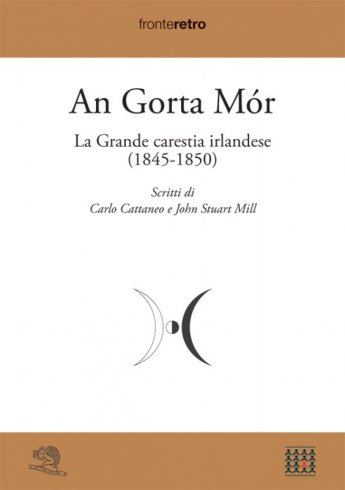
An Gorta Mór: The Great Irish Famine (1845-1850)
Written by Carlo Cattaneo and John Stuart Mill
Ireland 1845: an unknown illness hits the potato plant. Thus begins the great potato famine, an Gorta Mór in Gaelic, which had repercussions comparable to those of history’s most devastating epidemics; in fact, Eric Hobsbawm defined it as “the most terrible human catastrophy in European history” of that era.
Robbed of their almost-exclusive source of nourishment, between 1845 and 1850 (and above all in the “black year”, 1847), many Irish died not only of hunger, but also of diseases related to malnutrion, misery, and poor hygiene. Furthermore, in those years, thousands were forced to emigrate, especially to the United States, Canada, and Australia, massed together in inhumane conditions in filthy and infected holds that came to be called “coffin ships”.
In this volume, two great contemporary philosophical and economic thinkers recount the story of the Great Famine: Carlo Cattaneo and John Stuart Mill. Cattaneo’s works include two essays published in 1844 and 1860: “On the State of Ireland in the Year 1844”, which opens the volume, and “Of the Disasters of Ireland in the Years 1846 and 1847”, which closes it. John Stuart Mill offers his perspective in a series of articles which appeared in the “Morning Chronicle” between 1846 and 1847, important because the articles give an idea of how much the debate on the Irish crisis was still present in the English press.
Authors
Carlo Cattaneo
(Milan, 1801-Castagnola, Lugano, 1869), historian, economist, politician, patriot, student of the school of Enlightenment and empirical thought, and exponent of the Federal Republic. In 1824 he graduated with a law degree from the University of Pavia and in 1839 founded the scientific magazine Il Politecnico. In 1848 he was one of the main figures of the “Cinque giornate” insurrection in Milan. Leaving the battlefield to the moderate supporters of the Piedmont, he first went to Paris and then to Switzerland, where he taught philosophy in Lugano. In 1859 he returned to Milan and in 1860 was elected government deputy, only to refuse to swear an oath of loyalty to the king and thus never enter into the Chamber of Deputies. He was furthermore an advisor to Giuseppe Garibaldi in Naples and spent the final years of his life in Switzerland. His many works include: Israeli Interdicts; On the Insurrection of Milan in 1848 and the Subsequent War; The City Considered the Ideal Standard of Italian History; and Memoirs of the Public Economy from 1833 to 1860.
John Stuart Mill
(London, 1806-Avignon, 1873), philosopher and economist, educated under the influence of Jeremy Bentham and applied “organic arrangement” to the English empirical and liberal tradition. He carried out scientific studies in France and legal studies in England, from 1823 to 1858 worked for the East India Company, and between 1866 and 1868 was a member of the House of Commons, where he supported the women’s suffrage movement. He carried out intense scientific and journalistic work in the fields of logic, ethics, and economic and political thought. His works include: A System of Logic, Ratiocinative and Inductive; Principles of Political Economy; The Subjection of Women; Three Essays on Religion; and England and Ireland.





